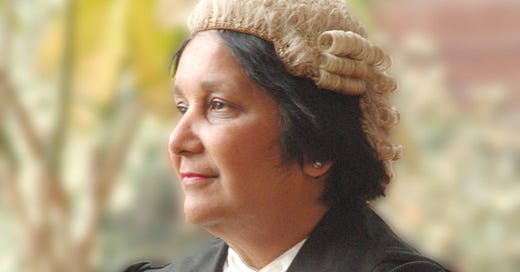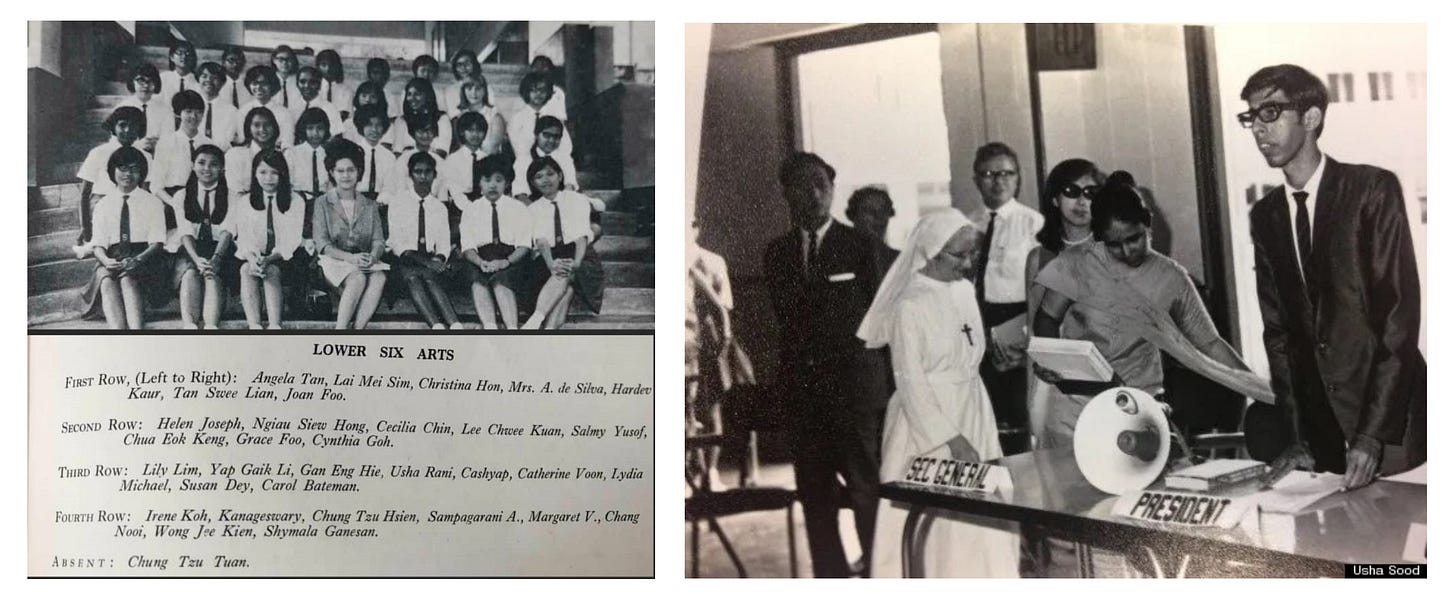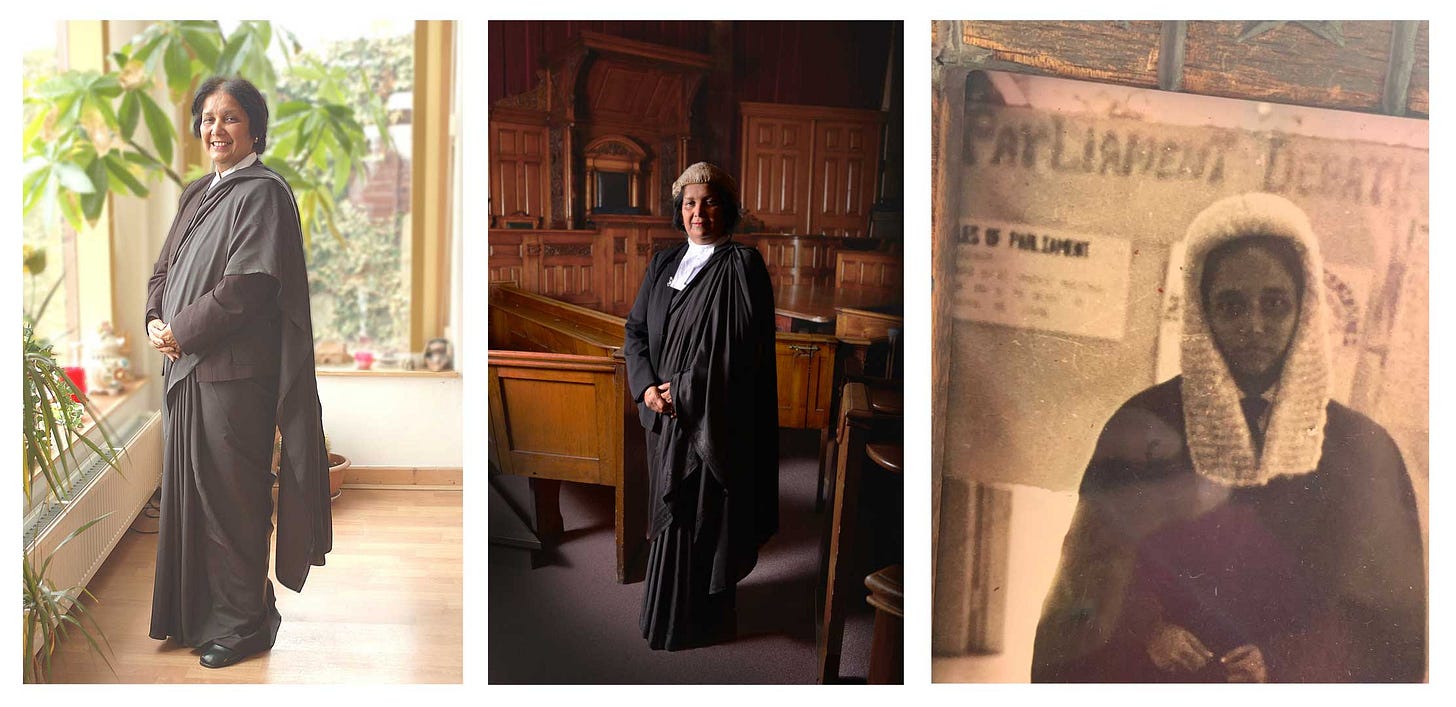GIVING A VOICE AND RIGHTS TO THOSE IN NEED; WHAT DRIVES MY PASSION FOR JUSTICE, FAMILY AND HUMAN RIGHTS With Guest, USHA RANI SOOD Nottingham, UK
Smitten By Faith Issue # 00019 11th December 2021
The well-known UK human rights Barrister, USHA RANI SOOD ( LLB (Hons); M.Phil ) and I go back a long way – a friendship that began in secondary school at the Convent Bukit Nanas in Kuala Lumpur. At the Convent, Usha and I had a shared love for voracious reading and energetic debating. Did we know then already that we would both end up as lawyers ? I recall when we were at Sixth Form the good fun we had debating – as though our lives depended on it - and how wonderful it was to be part of a mock United Nations General Assembly. Usha was dressed in a beautiful sari and with a suitably stern demeanour took on the role of the Secretary-General. The mock UN was held at our Convent jointly with St. John’s ( a boys’ school next door) and perhaps it was the thrill of debating toe to toe with the boys, we girls had a great time beating them! After Sixth Form, I went to the National University of Singapore to study law and Usha also studied law – but in the UK - at the University of Nottingham (giving up an unconditional place at Cambridge to do so). And, it wasn't just Usha who moved, but her entire family uprooted themselves from Malaysia to the UK. Life in the UK was certainly different to Malaysia which they had left behind. Usha and her 4 other siblings had to adapt quickly; a period which was made easier by the closeness of the family bond and the invaluable guidance of her parents. Usha’s father (the first Indian Assistant Commissioner of Police in Malaysia) taught the children that their deep Hindu faith was not exclusive; that they needed to have tolerance and compassion for others; and to value all faiths. Not long after they moved to the UK, unexpectedly - first her mother and then shortly after that, her father died. This was just after Usha had passed the bar examinations. Such unbearable tragedies and so cruel for the young Usha, who as the eldest at just 21 years old, was suddenly the breadwinner for the family. She fell apart but not for long. The Usha Rani Sood you see today – compassionate, articulate, brilliant, successful, courageous and inspiring was born out of the tragedies. God works His miracles.
Left : Class picture of Sixth Form. Usha Rani Cashyap ( her family name ) is in the third row- centre. I am in the front row, far right.
Right : Usha dressed up in her sari at the Mock UN General Assembly with the Boys’ School !
After graduating in 1974 (she was the only person of colour in the Law Faculty) and passing the Bar, Usha went into academia as a lecturer in law at Nottingham Trent University where she taught full time for 37 years as a Senior Lecturer, and after 1991 combining it with practice in 2008. In 1979 when she had completed pupillage, she was the only woman Barrister in Nottingham. In 1991, the plight of 7 refugee children whose father had been deported and whose mother and the children were also about to be deported, brought the compassionate Usha out of her comfort zone to undertake a unique foray into legal practice to argue for the first time, successfully, that the welfare of children must be paramount in migration law. Usha says that when she took up this first case which she did pro bono, little did she know then that it would take 20 years to resolve! With sheer brilliance and tenacity, Usha managed to save the children from deportation but not their mother. The children stayed on in the UK but Usha was determined to get their parents back. It took 20 years before Usha finally managed to successfully get the children’s parents back to the UK to be re-united with their now grown children.
Usha knew that once she dived into the realm of human rights and Public Law, there would be no turning back from the myriad cases for the vulnerable including honour crime, FGM, trafficking and even the rights of the elderly and families . So, in 1992, she set up her own chambers, Trent Chambers in Nottingham her UK hometown. Usha left the quiet of academia for Public Law because she wanted to do more for the rights of family, women, children and migration. With her cultural background, as a champion of racial injustice and human rights, the busy Usha also sits on many judicial commissions and committees. As a woman and a Hindu, Usha is very aware of what Asian women from the Indian sub-continent endure – forced marriages, dowry abuse, domestic violence and child abduction. In fact, Usha won the first UK dowry recovery case in 1994 and today, Usha and the other multi-cultural and experienced barristers at Trent Chambers (all of whom share Usha’s passion and vision ) have worked and won a whole range of ground-breaking cases from immigration, asylum, nationality, family law, civil liberties, human rights and racial injustice. She has been a regular presenter for the Centre for Parliamentary Studies, part of the UK Government’s Public Policy Exchange, on their Honour Based Violence Programme at Whitehall from 2009-2010. Usha was nominated for the Woman of Achievement 2015.Most recently, she was a specialist adviser to Parliament on the new Domestic Abuse Act (awaiting implementation)
Left and Centre : Current pictures of Usha Rani Sood, the Barrister.
Far Right : Usha as a 14 year old all dressed up in the regalia of the Speaker of the Malaysian Parliament at one of our school mock events.
So, today, we are fortunate to have the inspiring and unique USHA RANI SOOD tell us something about what she does and why she works so tirelessly to give a voice and rights to those in need.
___________________________________________________________________
GIVING A VOICE AND RIGHTS TO THOSE IN NEED; WHAT DRIVES MY PASSION FOR JUSTICE, FAMILY AND HUMAN RIGHTS
USHA RANI SOOD
Nottingham, UK December 11th 2021
I am a British human rights and family lawyer who gleaned knowledge and values from being educated at Convents in Malaya (later Malaysia), taking time to learn the Bible at school and then be inducted in a discursive way into Hindu scriptures and philosophy at home. All the cultures celebrated each other’s festivals which remain national holidays in Malaysia.
Learning about humanity as a child in Malaysia
My human rights values are somewhat innate and imbibed from childhood: My mother explained Diwali to us as children (when making us create gift trays for those local families in need, and those recently bereaved).
My mother to Me : “Just light a diya (oil lamp) in another’s home before you light it in your own home”
My father to me as a teenager (when rebelling against doing law): “The law will give you the tools to bring change and justice to the lives of those who have been wronged.”
Our childhood memories include our parents fostering a few children from the rubber plantations who had been abandoned or orphaned, and giving them a home, schooling, jobs and even helping with their marriages and children. Their generosity of spirit extended to helping our less well-off relatives over in India with their own and their children’s schooling, marriages and life needs. A cousin P, speaks of just saying how much she liked our favourite wedding kameez (stitched specially for the wedding in India). My mother then asked us to give them away to them when we were leaving for Malaya after our holiday. She dealt with our tears by saying “these children have little to enjoy. You have so much I will get them stitched again and you can even have two new ones each”. P says she once admired a green stone locket Mum wore and Mum just gave it to her with the gold chain it was on. Another aunt in India also recollects admiring a beautiful sari my mother was wearing for a wedding. Mum immediately took it off and gave it to her and wore something else.
Legal Human Rights Growth
My legal journey has been underpinned by both of those guiding principles from my parents, and to a large extent helped to overcome the significant barriers that prevailed including prejudice, discrimination (both direct and indirect) and isolation as a minority woman of colour in a cloistered sphere. My parents’ untimely demise had made me take up academia. Then, later at the age of 40, I was catapulted by a cry for help from a local politician into assisting 7 Sikh refugee children in one family (4 of whom had been born in the UK) to forestall deportation in a few days. My diary records: “The children were eerily quiet in my office as their 16 year old brother spoke to me, telling me that no lawyer would help. Suddenly, one of the little ones, Johnny, (aged 5) said to me, tugging at my sari, “They want to send us to this place called India. Will they have neighbours there?” I started to answer reassuringly: “Of course. Every country has neighbours….” Then I realised with a sinking heart, that he was talking about the TV programme, and that they would be lucky to have a roof over their heads, let alone a TV set.
As a family barrister aware of the welfare jurisdiction and its principles, I applied successfully for six of the children to be given the inherent protection of the English High Court, in wardship under the care of their 18 year old older sister – the only time it has ever been successfully used in immigration law. The children’s parents were deported, the mother being removed whilst the children were at school, but the Home Office failed in appealing the wardship. I continued to fight pro bono for their parents’ return, which I secured nearly 20 years later (my longest case!). In the intervening years, I also resisted the Home Office trying to pick on removing each of the children as they turned 18.
On a personal front, my own children developed a sense of giving early on during this early momentous case, offering to sacrifice their Diwali crackers and gifts over several years, so that the money (and their own unused/disused items) could be given to the family.
I was encouraged by family and friends to continue practice, and set up my own human rights set, Trent Chambers, in the early 1990’s, with the motto, “Integrity, Strength and Passion.” This has certainly been infused into all our ongoing Public Law and Family Law work. My pro bono work has included trying to reunite an elderly couple (married for 67 years), where the local authority had placed the wife in a care home and supervised his daily visits, restricting the couple to kissing only twice (on arrival and departure)! I also fought for the residents of a local village against selling off the school fields (bequeathed to the community in perpetuity by a former resident) to developers to build 800 houses.
I am always inspired by fellow humanitarians in the legal field, who have merged legal parameters with compassionate needs, such as Lord Bingham endorsing the core value which Article 8 of the European Convention on Human Rights exists to protect, in Huang v Secretary of State for the Home Department [2007] UKHL 11: " Human beings are social animals. They depend on others. Their family, or extended family, is the group on which many people most heavily depend, socially, emotionally and often financially. There comes a point at which, for some, prolonged and unavoidable separation from this group seriously inhibits their ability to live full and fulfilling lives. Matters such as the age, health and vulnerability of the applicant, the closeness and previous history of the family, the applicant's dependence on the financial and emotional support of the family, the prevailing cultural tradition and conditions in the country of origin and many other factors may all be relevant."
This awareness has extended into many other areas’ vulnerability within my own, and Trent Chambers’ work which has human rights as our main area of legal practice. My input has extended nationally to working on domestic violence reform, race equality and to international spheres on collaboration on honour crimes and refugees. I was appointed on the McPherson Committee to implement the serious recommendations from the Lawrence Inquiry for justice and equity in policing and race.
The eternal battle is about affecting social awareness and fighting for legal reforms, all of which are difficult to achieve in an increasingly apathetic and uncaring world. Currently I am the lead legal member of a national NHS -led campaign to modify the UK’s draconian Adult Dependent Relative visa rules (implemented in 2012), which saw a regressive fall from more than 2000 elderly entrants a year to an average of 162 per year in 2016 (and even less recently). I have worked on hundreds of elderly parent cases to try and unite frail older migrants with their settled children, many involving medical/health professionals but also from other sectors of the community. The Covid pandemic has highlighted the unfairness in the UK government’s expectation that familial care can be delivered remotely, or by multiple trips to elderly parents abroad, or by unregulated and often sub-standard care from strangers. So many elderly parents have been left on their own, separated from families and long been denied the fundamental rights to psychological and physical wellbeing; the right to be cared for unto death and within the fabric of their nuclear family.
My ultimate satisfaction lies in nearly all our cases being able to achieve beneficial results (many only after prolonged litigation). Above all, the joyful cries of Shukran/Amen/Dhanyavad and the blessings of the families when we succeed reinforce the personal resolve to continue. All religions teach us compassion and care; but to be able to live with such actions daily is humbling.
As the Bhagvad Gita says: “The person who has let go of hatred, who treats all beings with kindness and compassion, who is always serene, unmoved by pain or pleasure, free of the “I” and “mine,” self-controlled, firm and patient, and whole mind is focused on the Divine—that is the person I love best.”
________________________________________________________________________
Editor’s Note :
Dear Reader, thank you for reading this weekly edition of SMITTEN BY FAITH.
ALL articles in every issue are FREE.
For those of you who upgraded to be a PAID Subscribers for US$ 60.00 a year, thank you so much ! All proceeds go to the Regina Apostolorum Foundation to promote Catholic higher education.
PAID Subscribers will also receive the digital copy of the recent book by Joan Foo Mahony, ‘LATE HAVE I LOVED THEE’ ( see the bitly link available only to Paid Subscribers ) and at the end of 2021, you will receive via Bitly link, VOLUME ONE 2021 of Smitten By Faith, a DIGITAL COMPILATION of each year’s articles. Paid Subscribers will also receive additional exclusive material from time to time.






